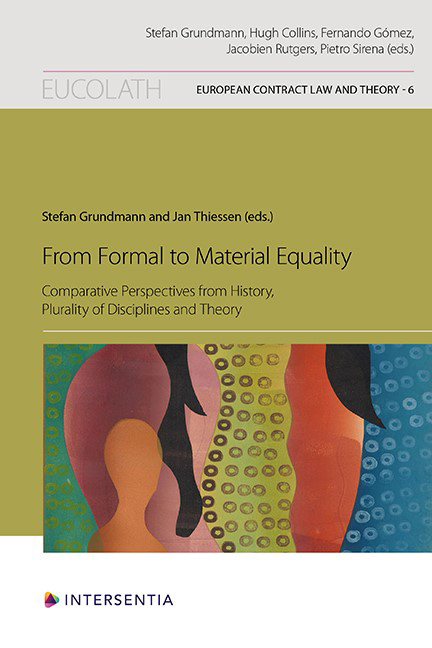 From Formal to Material Equality
From Formal to Material Equality Published online by Cambridge University Press: 15 November 2023
All the words in this title may seem, if not provocative, at least highly questionable:
– To say that private law has a foundation.
– To affirm that it is the equal dignity of human beings that is at its foundation.
I will not dwell here on the first point, which is actually obvious: that private law has a foundation (in the sense of a Grundnorm). This is not a jusnaturalist position, and even less a theological conviction, but a structural and logical necessity. All the greatest philosophers have said so, at least since Aristotle. In law, Kelsen memorably explained it: although the jurist, in a pure theory of law, does not have to concern himself with the Grundnorm, a legal system necessarily presupposes such a logico-transcendental hypothesis. If each norm derives its validity from a norm that is superior to it, things must, at some point, come to a halt with a dogmatic statement of a different nature from the norms laid down. It is futile to try to go beyond this and to try to found the foundation, because the foundation is without foundation. The search for reasons necessarily stumbles upon an ultimate “why” that cannot, in turn, be founded.
I will focus here on the second question, or rather the second assertion, namely that it is the equal dignity of human beings that is the basis of private law. The examination of this question implies the recognition that, contrary to Kelsen’s view, the jurist must be concerned with the question of the foundation. It also means recognising that this foundation is not merely a structural place about which there is nothing to say, but that it must be given substance. The foundation cannot be a simple empty space, a purely formal logico-transcendental condition, or, as those interested in the dignity of the human person sometimes put it, a simple “placeholder”. In other words, something must be said about the substantive content of the Grundnorm.
To save this book to your Kindle, first ensure [email protected] is added to your Approved Personal Document E-mail List under your Personal Document Settings on the Manage Your Content and Devices page of your Amazon account. Then enter the ‘name’ part of your Kindle email address below. Find out more about saving to your Kindle.
Note you can select to save to either the @free.kindle.com or @kindle.com variations. ‘@free.kindle.com’ emails are free but can only be saved to your device when it is connected to wi-fi. ‘@kindle.com’ emails can be delivered even when you are not connected to wi-fi, but note that service fees apply.
Find out more about the Kindle Personal Document Service.
To save content items to your account, please confirm that you agree to abide by our usage policies. If this is the first time you use this feature, you will be asked to authorise Cambridge Core to connect with your account. Find out more about saving content to Dropbox.
To save content items to your account, please confirm that you agree to abide by our usage policies. If this is the first time you use this feature, you will be asked to authorise Cambridge Core to connect with your account. Find out more about saving content to Google Drive.